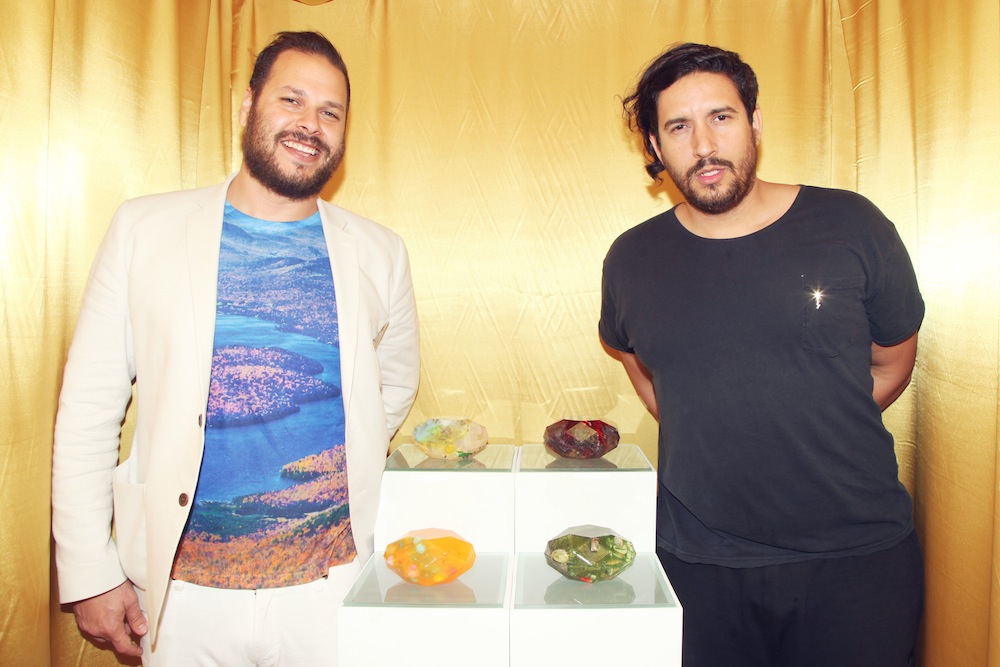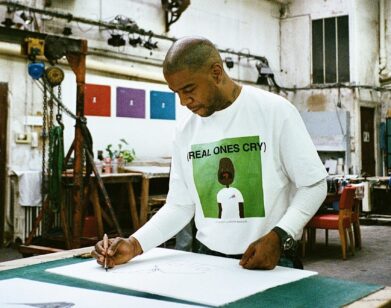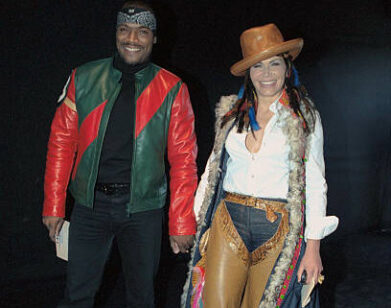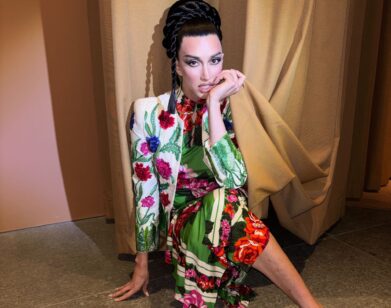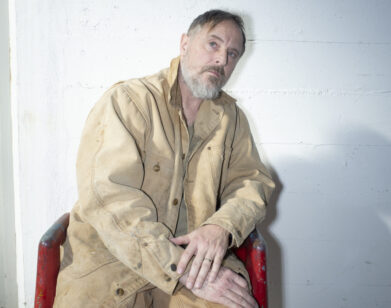FriendsWithYou’s Psych-Out
The work created by L.A.-based art collaborative FriendsWithYou is none of the things—alienating, esoteric, pretentious—that so often intimidate those outside the art world. From monstrous blow-up bounce houses to the immersive Rainbow City—a surreal world of grinning inflatable shapes they unleashed upon the High Line in 2010—the duo’s work is refreshingly positive and inclusive. Comprised of Samuel Albert Borkson and Arturo Sandoval III, the physical art produced by FriendsWithYou is a byproduct of their overall motto: “Magic, Luck and Friendship!”
FriendsWithYou’s most recent undertaking to disseminate its “happy virus” exists on a much smaller scale. Its Psychic Stones, now available at Chelsea’s PK Shop, are symbolic objects whose meaning and importance varies on an individual level. The artists offer two-on-one consultations in which they discuss your upbringing, memories, idiosyncrasies, and personal goals. They then use that information to produce a crystal tailored specifically to fill your existential voids. At their most basic level, the Psychic Stones provide a therapeutic experience and allow one to form an individualized connection with Borkson and Sandoval—two impossibly pleasant and positive people. In a greater sense, they raise questions about how to adapt religion to our contemporary, disconnected world.
Yesterday evening, PK Shop celebrated the artists’ Psychic Stones with friends, rock candy, Champagne, and good vibes. We took the opportunity to chat with Borkson and Sandoval about the message behind FriendsWithYou, modernizing religion, and the happy virus.
ALLYSON SHIFFMAN: How do the Psychic Stones fit into the overall FriendsWithYou message?
SAMUEL ALBERT BORKSON: Our practice is about redesigning spirituality for modern usage, and we do that through a variety of mediums. This was a way to be more interactive with people and affect them person by person, on a deeper level, versus the big spectacle that affects many people at a time. We’re including that more and more into our practice. We want to expose and deepen the connection between people in this isolated, weird world where we’re so disconnected.
ARTURO SANDOVAL III: It has an ongoing effect too. The experiences were very temporary and very ephemeral. This is something that stays with you.
SHIFFMAN: It’s nice to see this sort of thing in Chelsea, because the art scene here can be a little alienating. What you do is very inclusive.
BORKSON: Accessibility is huge for us. Art is an amazing tool for that. There are so many artists with these amazing, philosophical, deep, beautiful concepts and I feel that if humans are alienated from the learning device of art, artists are not doing their job.
SANDOVAL: We think of ourselves less like artists and more like we use art to get this idea across. It’s different than people who are in the business of making objects. There’s amazing beauty to that, but we really are trying to redesign the systems that are crucial to our happiness and our whole human existence. It sounds cheesy, but it’s serious talk.
BORKSON: Which brings us to what spawned the Psychic Stones. They came from this idea called Psychomagic, which was coined by Alejandro Jodorowsky, the director and artist.
SANDOVAL: He directed The Holy Mountain and Santa Sangre. He started mixing trades he learned from shamans and applying those systems of theatrical beliefs into a more archetypal, symbolic thing. The symbols trigger the psyche into doing beneficial things for you, and that’s the whole gist of the stone. We get this information from you and project that into this potion that we put into the stone. Then we serve that as an object that becomes a focal point for you to manifest whatever it is that we talk about and that you need out of this object.
SHIFFMAN: What is Psychomagic, specifically?
BORKSON: The whole idea of Psychomagic is that art is meant to be healing and any art that isn’t healing is not important. So many people have been devoid of the ability to go to church or temple and really connect with other people. This is one of our stabs at reestablishing this powerful connection and power inside each person.
SANDOVAL: Those [religious] systems that are in place haven’t transitioned to the modern times at all. After the Scientific Revolution, it really got discredited and we haven’t reassessed that value system.
SHIFFMAN: Yes, because whether or not you believe religion is “true” or “false,” there is value in what people get out of it.
SANDOVAL: Religion is just a delivery system.
BORKSON: People are searching for it and they’ve found replacements—going to a big sports thing, education… we’ve tailored all these systems to make up for this.
SANDOVAL: Instagram. [laughs]
SHIFFMAN: [laughs] That’s my religion.
BORKSON: These things are connective, but it’s temporary. That’s why you check your phone a million times, to keep getting that satisfaction. But that’s a sign that maybe we’re kind of off course.
SANDOVAL: We have the necessity for this, but we don’t feel Christian, we don’t feel Jewish, even though those are the systems that are handed down to us.
BORKSON: It’s hard to believe those stories.
SHIFFMAN: So you think religion needs a redesign?
SANDOVAL: We redesign everything a thousand times, yet no one is making attempts at reinstituting those really basic human needs. So that’s our thing, and we do it in a crazy variety of ways. We’re trying to develop TV shows for kids—it’s not medium-specific, it’s really about the idea. Where it becomes art is in that we don’t treat it as a dogmatic practice at all. It’s a conversation —that’s why art is a good avenue for this work.
BORKSON: It’s the only avenue, actually, to do all that we want to do. How do we affect the world in the greatest way possible? It’s this happy virus that extends out slowly but surely. Religion is amazing in all that it tried to do. Our point is not to say that it’s wrong. Our point is it doesn’t have to have that name, or it doesn’t need to be that God is telling us things.
SANDOVAL: The symbols have become almost completely devoid of their original meaning. Religion took these archetypical images and attached a myth to them. We’re reserving up symbols and letting people attach their own myths. It’s a lot more free.
BORKSON: Open-source religion is exactly the idea. FriendsWithYou—everybody can attach themselves to this idea.
FRIENDSWITHYOU’S PSYCHIC STONES ARE NOW AVAILABLE AT PK SHOP IN CHELSEA.

